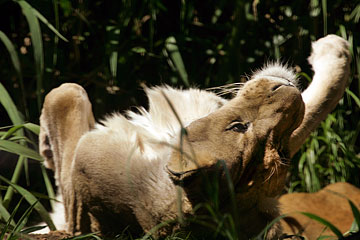 COURTESY Apollo, a 21-year-old male lion, was euthanized yesterday. Apollo suffered from kidney failure, arthritis and muscle atrophy. He arrived in Hawaii in 1986 and quickly became a favorite with zoo staff and visitors. CLICK FOR LARGE |
|
The lion king is dead
Apollo the lion, suffering kidney failure at the Honolulu Zoo, is put to sleep
The husky roar of Apollo the lion will no longer resound in Waikiki, as the longtime "king" of the Honolulu Zoo breathed his last yesterday, suffering from kidney failure. He was 21.
Apollo, an African lion, was 6 months old when he arrived in Hawaii in April 1986 from his hometown of Quebec. He quickly became a favorite, roaring to announce his presence every morning and evening. But his health had faded recently and he was euthanized yesterday.
"He's going to really, really be missed, not just by our staff but by the people who have seen him throughout the years," said zoo Director Ken Redman. "Male lions are really beautiful animals. Apollo was one of the most beautiful. When he posed, that was just a masterpiece."
Lions typically live about 15 years in the wild, but they can last well into their 20s in captivity, with health care and a good diet.
 DENNIS ODA / DODA@STARBULLETIN.COMEthel Louise the lion, who was rolling over after a nap, and her twin sister, Samantha, are the two remaining lions in the Honolulu Zoo's exhibit after Apollo, a 21-year-old male lion, was euthanized yesterday. CLICK FOR LARGE |
|
Apollo leaves behind two companions, twin lionesses Ethel Louise and Samantha, age 21, which have been at the Honolulu Zoo for a decade.
Along with his kidney problems, Apollo was plagued with arthritis and muscle atrophy. He spent most of his time asleep, even more than typical lions, which sleep for 16 to 18 hours a day.
The zoo will begin looking for a young male lion to transfer to Honolulu, through the Lion Species Survival Plan network, Redman said. It may also eventually line up a young female, as well.
Apollo, born at an animal facility, had no offspring. He was neutered because his genetic line was already well represented in the captive population.
"Because we have space limitations in zoos, we try to reproduce the ones that are as genetically unrelated as possible," Redman said. "The ones that have a lot of brothers, cousins, sisters and aunts, they're the ones we stop breeding."
The zoo now has two "genetically valuable" tigers, a male and a female, and it hopes to have tiger cubs before long, Redman said. "We hope we could get a genetically valuable lion."

